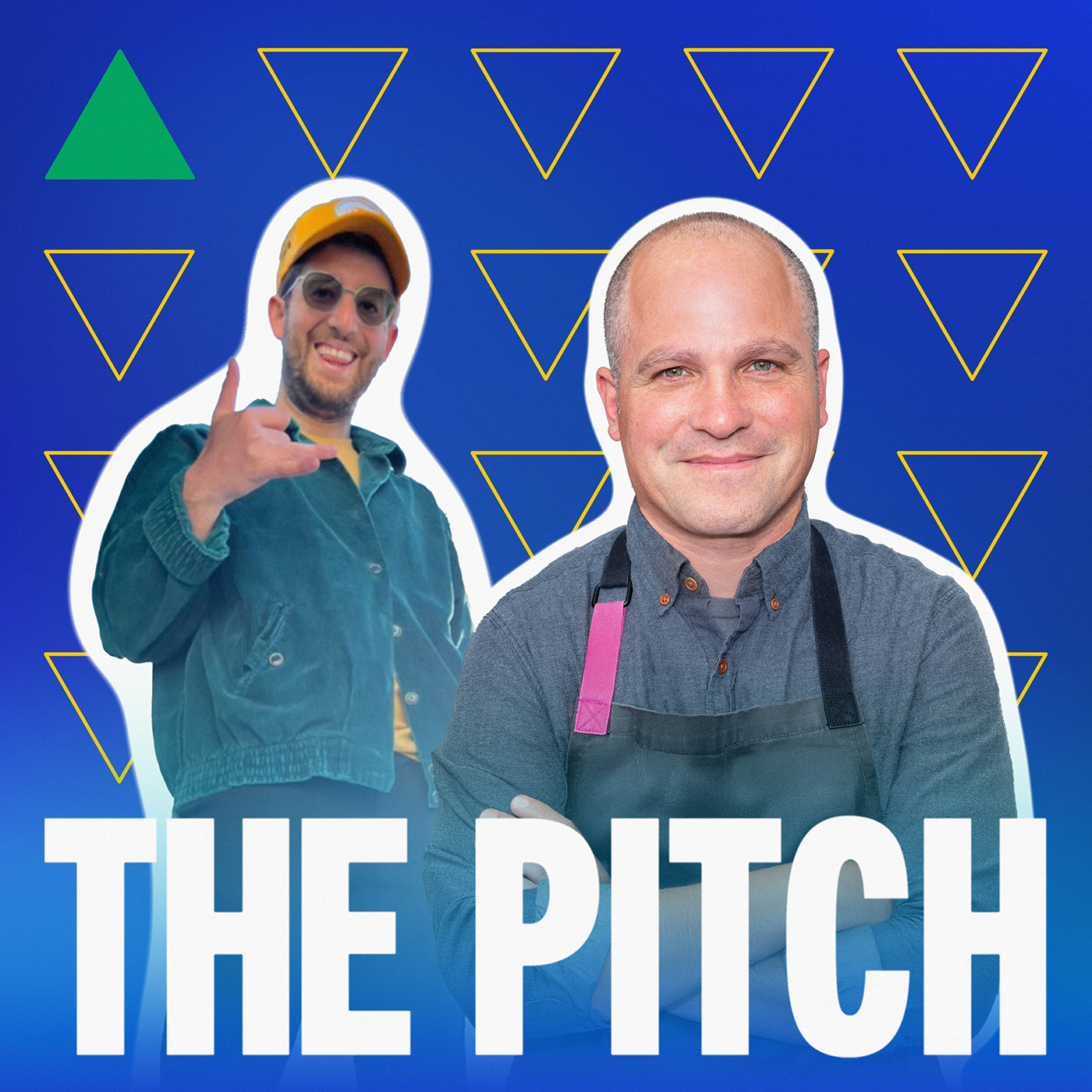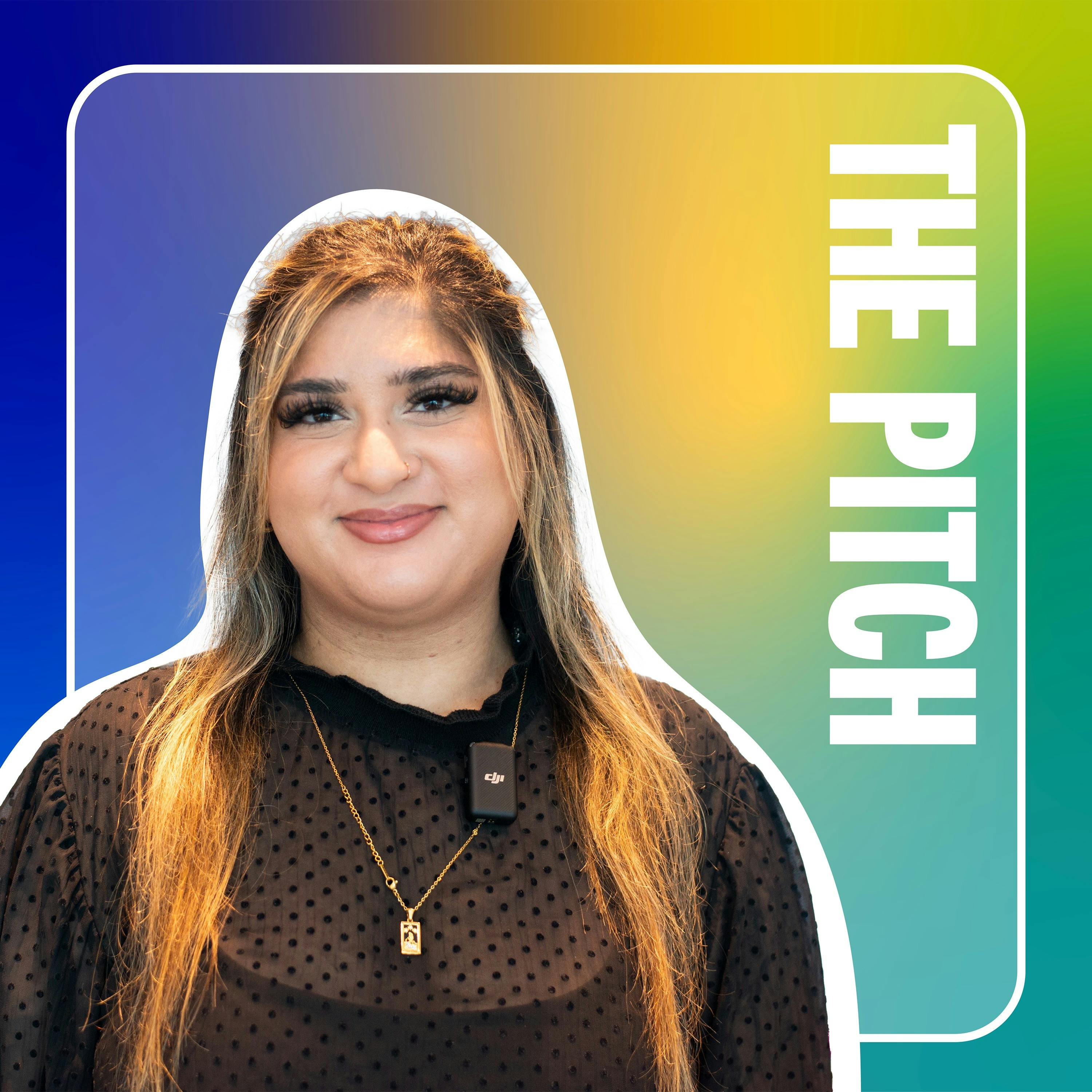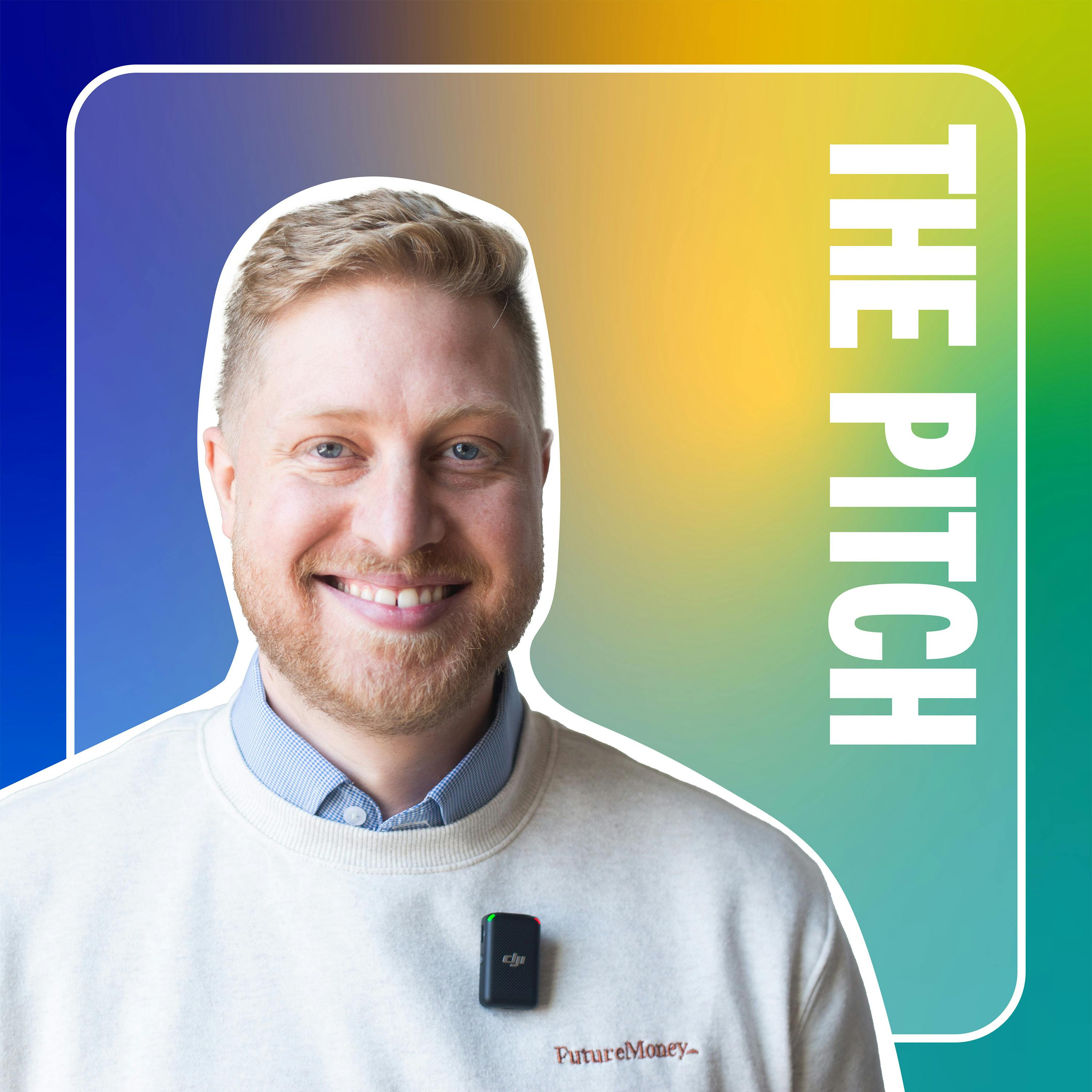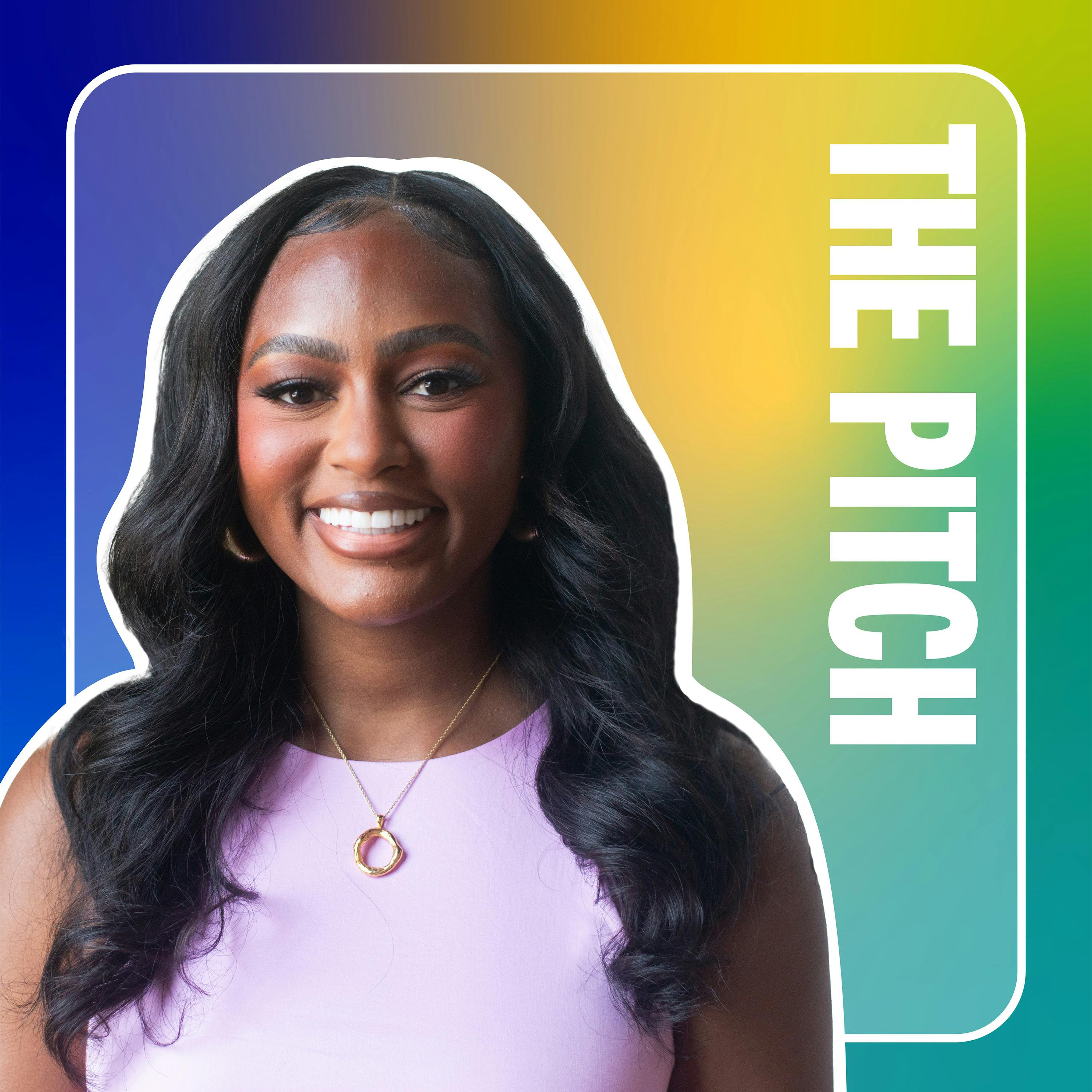#27 Qleek Pt. II: What Happened After The Pitch

The surprising story of what happened to one startup after its founders pitched to investors—and thousands of listeners.
Enoying the show? Use this link to text a friend!
I’m Josh Muccio, and this is The Pitch from Gimlet Media. Where real entrepreneurs pitch to real investors.
Ismail: My name is Ismail.
Jillian: Ismail.
Johanna: And I'm Johanna. And we're the founders of Qleek.
Jillian: And your company is Click?
Johanna: Qleek.
If those voices sound familiar, it’s because those two founders pitched to our investors on the show back in November. And if you haven’t heard that episode yet? There’ll be spoilers everywhere in this episode. So you may want to hit pause, go back and listen to episode 16, and then come back here. If you have heard the episode, but it’s been a while, don’t worry, we’ll hit the highlights.
Okay, Qleek, as you all know, is a startup designed to bring together the ease of digital music with the beauty of vinyl. When the founders, Ismail and Johanna, were on the show, they talked about how these little wooden, hexagon-shaped Qleeks would bring back the joy of sharing music. They showed off their Qleek player and described how this was the next logical step for music collectors. But, the investors didn’t go for it, and the founders ended up walking away without funding.
Well, a lot has happened since then — including something that really surprised us. So we want to revisit this startup and tell you all about it. But let’s first rewind briefly to back when they pitched on the show.
Here’s founder Ismail describing why he thinks the market is ready for a company like Qleek.
Ismail: In 2016, 50% of Americans have gifted a music gift. Okay. 50.
James: What does that mean? What did they gift?
Ismail: That's a great question. 75% of those gifts were physical. 75%.
Daniel: What is that, like CDs?
Ismail: And 30%, the highest, the most gifted item today, in 2016, wait for it, is still the CD.
Daniel: No way.
Ismail: Yes.
James: Where do they get a CD?
Johanna: Amazon.
Ismail: They buy it on Amazon. They buy vinyl. They buy gift cards.
James: How do they play a CD?
Ismail: They don't. People don't.
Ismail and Johanna said that they believe Qleek can step into that space, becoming the go-to item for gifting music.
But the investors pushed back on the idea that people, especially millennials, would want another… thing… after all, part of the appeal of music streaming services like Spotify is that… they don’t take up any space.
Jillian: But also if you, one of the mentalities of millennials is that they don't want to have things. They're trying to get rid of their things. So they're investing more in experiences. Everybody knows that. So because one of the reasons is they travel around a lot. They don't want to have records. They don't want to have lots of books. They don't want to have lots of things. So they're actually, I feel that the mentality is counter intuitive to what you seem to be selling.
Ismail: I agree with you. Except for gifting. The study that I can share with you shows that millennials are the heaviest gifters in today's world.
Ismail argued that investors were missing out on a huge market. This millennial gifting trend. They want to gift music to one another, but they don’t necessarily have a CD or record player. So Qleek is a way to gift music in a new and beautiful form that people can actually enjoy.
Jillian: Yes, I see the design and I appreciate...
James: You’re selling an emotion, cultivated in part by the design.
Ismail: One musician told me, records are not, when people buy records they don’t buy music. They buy the container that has the music.
Jillian: Oh well some, well that’s ridiculous. I’m going to push back on that. It’s both. It’s the both. People buy records because it is the purest form of music. But there is something tangible and lovely, but one of the reasons that this has had, the transformation in the music industry is because people wanted to condense their things. People wanted to be able to…
Ismail: I don’t necessarily agree with that. I think, that’s one of the biggest misconceptions about why, what happened in music. Because we apply what happens in other sectors of tech to the music space. But in my opinion, what happens in the music space is we shifted to streaming, which allowed you to just access 30 million songs in one click, instead of buying a CD and having 12 songs. And that was the difference. Paying $10 a month to access 30 million songs, that was the killer thing for me to switch to Spotify. Not because it was smaller, or decluttered my house. Actually it made me sad, sort of. And one of the proofs of that is the resurgence of vinyl. In my opinion, it’s very symptomatic of what’s happening in the music space. Millennials are buying vinyls like crazy. Why? Because they never see and touch the content they have and they love.
And with that, the investors made their decisions. Here’s Daniel Gulati.
Daniel: So here’s where I’m at which is, I think this is in many ways kind of like a classic consumer product bet. You’re inventing this new format, and no one here in this room or anyone knows what the adoption will be. And so I think if you get adoption, if you get this critical mass of consumer adopters, I think almost everything, at least for me, lines up, in terms of business opportunity. I think that you can easily monetize And I think you can build a really big business. But I think the germ of this business really starts with consumer adoption. And so that’s why I feel really exposed here. Because you could be inventing the next mp3. And so, but I just, if I really sort of think about who will adopt this, I think, I just can’t help but think it’s a niche market. And for that reason, I’m a pass. But I think what you’re doing is really interesting and could be a really, really big thing.
The rest of the investors followed suit, and in the end, no one went in on Qleek.
Daniel: I feel like we all could be horribly wrong here.
Jillian: I know that! I know that! You’re right. We could be horribly wrong. And a piece of me feels that. Thank you so very much.
Phil: It was a pleasure meeting you both.
And that was that.
When I caught up with Ismail and Johanna a couple of months after the Pitch, things weren’t looking good.
Josh: you were raising $800k, correct?
Ismail: Yes, yeah.
Josh: Did you raise some portion of that?
Ismail: Not right now, now.
Josh: Okay, so you decided to cancel the round?
Ismail: Yeah, postpone it.
They had postponed the round — and manufacturing had ground to a halt.
Ismail: All I can say is we've run out of stock for the player, so we can't sell it anymore because we don't have any more units in stock.
Josh: Oh, you don't have any more of the players?
Ismail: Yes.
Josh: So you're only selling the Qleeks right now?
Ismail: Yes.
Josh: Isn't that a problem that you don't have any players to sell?
Ismail: It is somewhat a problem, but it's a problem we have to deal with. We don't have the funds to make a new production run and sell more players, and so we don't do it until we raise more money.
Josh: Guys, that is so tough! Like, I'm just trying to imagine being in your shoes, like trying to grow this thing and like having part of your product be unavailable, part of the value prop of what you're selling.
Johanna: Yes, disappointing, because we have a lot of demand and we would love to sell, but we can't because we don't have the money to run the production. So it's a tricky situation.
Josh: Do you have any doubt in your mind that this is gonna work?
Ismail: Of course we do. I think doubt is healthy. We had doubts since we started, doubts about 'Is it gonna work?' But not about 'Is it a good product,' because we know that it is. The doubt is about, 'Can we execute so that we can fund this company?'
Ismail: And that's what we're trying to do.
And that’s where we left things in November. After the break, what happened next?
[break]
Welcome back. When we left off, the founders of Qleek were struggling to see a way forward for their fledgling startup.
Well, you know how they say that it gets worse before it gets better? Well, it got worse for Ismail and Johanna in the month that followed.
Ismail: we stopped all the salaries we went in survival mode We had this discussion that we would try a s much as we can until December, until after Christmas. And if we see that after Christmas that the standalone Qleeks didn’t sell, and we ran out of money, we would just close the doors and call it.
Josh: What did it feel like to be at the place where that's the decision you're having to make?
Ismail: Ummm it was between heartbreaking and like getting so close to launching a product and seeing if it's gonna succeed or not. And having to shut down just before that because we couldn't secure funding was we were like "Oh my god, we need to do something. We need to find a solution." And the solution was, let's keep doing it with whatever we can until we are sure that this is not a success. And if it's not a success then there's nothing more we can do. We would have done everything and we would have to stop.
So they kept on coasting for as long as they could,
Until... one night in November. While Ismail was in Paris...
Ismail: I was at a restaurant with friends and then we started getting flooded with messages from people on the website. And I'm like “What, wait, what's happening?” And then, “oh The Pitch just aired. What the hell?” And so we're like “Why do we have so much traffic? It's not normal.” And then it kept going and going. And we see like hundreds of people on the website. And like 50 messages per minute. It was crazy. We, I think, the day the episode aired, we had about 500 pre-orders of the player. but the funny thing it was, we were in Paris and so there was time difference. And we couldn't shut up, shut off the chat module on the website. So we ended up like spending the night answering people's comments on the website which was pretty sweet.
As flattering as all this new attention was, it felt bittersweet for the founders.
Ismail: It was at the same time very, very helpful that The Pitch aired at that time. And also heartbreaking because we were like "oh my god we're so close." We were going to shut down but…
In their fight to keep Qleek alive, they were about to get an unlikely ally. Because halfway around the world, this guy was listening in.
Matteo: So, I was listening to Qleek, I was driving as always it’s the traditional, typical day in Saudi Arabia. Sunny
That’s Matteo Terrevazzi. He’s an analyst in the oil and gas industry. Living in Saudi Arabia. And he listens to the show every week, on his Thursday morning commute into work. But there was this moment in that Qleek episode that seemed to strike a nerve for Matteo.
Matteo: I was actually at a certain point, I was talking in the car, on my own, saying, wow, that cannot be true. Or you know, was trying to debate with the founders -- or with the investors, sorry -- saying, no, I'm a millennial, you're wrong, you're wrong, you're talking to me. come on, no! It's because I'm collecting it. So I'm buying for the sake of yanno to have a physical object in my hand that I can show to my friend, and eventually it is a limited edition
Matteo was so fired up and felt so adamant that Qleek was a great idea — that he decided to do something pretty radical.
Matteo: I mean, I decided to -- to invest straight away after -- after the end of the podcast.
That’s right. After hearing four venture capitalists all turn down an opportunity to invest in Qleek, he decided that this was the company where he wanted to put his money.
Matteo: Since they all tend disagree with what Ismael is selling, and I tend to believe that he's right, why don't taking, you know, what about taking a contrarian view? because as one of your investors says -- you actually -- I know, I've got the quotation here: "The only way to make money in VC is to make a non-consensus view that turn out to be right." this is probably the right time to apply this principle.
All day at work, that feeling of urgency didn’t subside for Matteo. He knew in his bones Qleek could be huge, and he wanted to be a part of it. But first, he had to make contact with Ismail.
Matteo: So once I got home, so less than 12 hours later, I wrote him an email, and that was the first contact
While Matteo might have felt like he’d just fired off this momentous email, for Ismail, it was actually… not that unusual. He’d actually gotten cold emails like this before — people who claimed to be interested in investing in Qleek. And nothing ever came of it. But there was something about Matteo’s email that struck Ismail.
Ismail: You could see how excited he was about the product. He was expressing interest in investing, but mostly the email was a lot of love for what we're doing. A lot of comforting words about how the investors didn't get the...what we were pitching, and the pitch was not working with them because they are not millennials. And I think I followed up right away with like “Hey Mateo, if you want to chat about it, I would love to hear more about what you thought about the episode
So they got on a call together, and it immediately became clear to Ismail that Mateo was very serious about investing… but maybe not as much as Qleek really needed.
Here’s Matteo.
Matteo: I told him, well, I'm willing to invest at this point only 10K I’m not an institutional investor this is what I can do And when I told him 10K, I think he was a bit disappointed. I think he thought I was like a sheikh, a Saudi sheikh, willing to put one million or two. I’m just a poor Italian guy
Josh: He thought you were a Saudi prince that wanted to invest millions?
Matteo: (laughs)
A $10,000 investment from some random listener is exciting… but it’s not exactly gonna pay the bills. But, Matteo knew some people who he was certain would be just as excited as him about the opportunity.
So together he and Ismail hatched a plan: what if Matteo brought all these people together and created a pool of money? They would all invest together in what’s known as a syndicate. So Matteo got right to work fundraising for Qleek.
Matteo: the email that I sent to my colleagues was, “Stop Investing in Bitcoins.” That was the headliner.
Josh: (laughs) I love it! Are you serious? Stop investing in bitcoin, invest in -- what did you say?
Matteo: In -- now, invest in the future of the CD. So I told him some -- invest in the future of the CD, yeah, that was my one -- one sentence idea.
Josh: And what kind of responses did you get?
Matteo: I remember one of my colleagues said, this is bullshit. This idea is super stupid. And actually, he wrote me an email, and I sent it to Ismail and I said, “well, there are other people that think Qleek is not working.”
Josh: I bet he appreciated that. He's probably like, thanks Matteo, thanks for sending me that.
Matteo: Well, but this is -- but on the other -- on the other -- on the other side, I was super passionate. So I was super aligned with him. So I would say, I just wanted to be transparent. So I shared with him all the feedback that I got. But on the other hand, all the millennials were very excited.
The fact that Millennials were excited was all the proof Matteo needed. He was totally sold on Qleek—and, like any true believer, he evangelized it to everyone he knew.
Matteo: Yeah. So I texted my wife, and I texted my brothers, And they were all excited. Well, I was super passionate. I said, guys, I found the perfect startup that I would like to invest, check this out, I send them the link of the podcast.
Slowly a group of would-be investors started to come together—some Matteo knew, and some he didn’t.
Matteo: So there was a colleague of mine, he was in Hong Kong. My two brothers in Italy. One person was in Paris. So also different time zones. But it was super exciting. I was super thrilled, you know, to have the idea, to put things together
From his home in Saudi Arabia, Matteo worked to get all of these people — nine in all, living on three different continents — organized together and invested in Qleek.
Ismail: he managed to do it. He managed to get people together—people who even he didn't know. It was very, very epic.
Matteo: I was willing to do everything possible, you know, spending all the night up, finalizing the contract, and was super happy that we did it. And the idea was that the humble guy listening from 8,000 miles away to this story and deciding, you know, we can help -- that was probably a bit naive and simplistic. But eventually, we did it.
Matteo and eight other people were now proud owners of a piece of Qleek. Together through their new syndicate, they invested a total of $53,000 in the company.
Josh: What do you expect to come out of your investment in Qleek?
Matteo: So I -- I -- well, I told to my colleagues that basically they turned down the offer. I said, okay guys, if the day that I'm driving a Lamborghini, I'm parking a Lamborghini, then you -- you have to understand that this is the day when Qleek has, you know, been valued like 100 million dollars. So I told every --
Josh: (laughs) That's how you know you were wrong. I'll drive up in a Lamborghini, and then you'll know.
Matteo: Precisely, exactly. But well even if I'm losing all my investment -- eventually I put 15K on my side -- even if I lose all of them, or if I don't get a super big return, I -- you know, I will have learned a lot. I have a direct connection with the CEO of a very young startup based in the US. And who knows, maybe in the future, I can, you know, help other startups or, you know, find -- you know, create a startup in Italy or something like that. I honestly don't know at this point in time. But this is good lesson, you know, good trial and error kind of experience that I can use in the future.
And for Ismail, it ended up that the syndicate’s investment wasn’t the only money that Qleek got — because right around the same time, Bose also made a significant investment in the company.
In a matter of just a few weeks, Qleek came back from the brink. They now have some runway to fulfill bulk orders, pay for marketing, and refine the product. But maybe most importantly, they got a little peace of mind...
Ismail: When I knew we were okay... I spent, I went out. I got myself a beer. Sat down. Drank my beer by myself. Started texting people because I was so excited. Couldn't sleep for the entire night. I ended up pacing in the Airbnb like a crazy person.
Josh: [chortles]
Ismail: — With a smile on my face and saying, “okay, we're doing this. We're still alive and we're gonna make it.”
Josh: Like, what were the thoughts flowing through your mind? What were you thinking about that kept you up?
^
Ismail: I think one of my biggest fear was not to shut down the company. My biggest fear was to set down the company knowing that it still has potential for success. Yeah, that's my fear. And now I was pacing and thinking, “Okay now it's on our hands again. It's up to us. It's not up to investors. it's not up to other people. It's up to us. We have our destiny in our hands. We have the company. We are at the helm of the company and we can make it a success if we do the right things. And so I was trying to think about all the right things that we need to do. And how exciting that is.
This is the part where Ismail and Johanna ride off into the sunset...except in the startup world, this is only the beginning.
We are going on a short break, because, well we’re in the midst of recording new pitches. Right this very moment actually, in Oakland, CA. We’re recording a whole new batch of episodes. I’m stoked about it. We’ll be back in your ears again, wait for it… drumroll please… on March 28th. Which is totally reasonable, you can make it 4 weeks. I believe in you.
Alright, see you then.
Our show is produced by me, Josh Muccio, Kareem Maddox, and Molly Donahue. We are edited by Devon Taylor.
We are mixed by Enoch Kim. Original music composed by The Muse Maker. Our Theme Music is by Breakmaster Cylinder.
Lisa Muccio plans our recording events and thanks to Asthaa Chaturvedi for her reporting on this episode.
We found out about Qleek because they applied to be on the show. Founders can apply by going to thepitch.show/apply
All right -- you’ve been listening to The Pitch from Gimlet Media. We’ll be back on March 28th, see you then.











